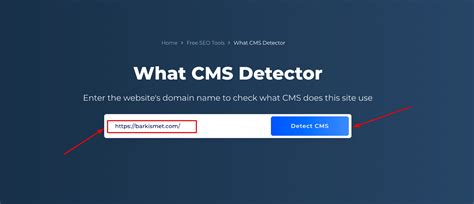whois cms,cms detector website,whois cms,The CMS Detector identifies the Content Management Systems a website uses. You can simply enter the site’s domain, and the tool will detect CMS. It . Men's Replica Hermes Bags; Hermes Handmade Bags. Hermes 2002 Handmade Bag; Hermes 24/24 Handmade Bag; Hermes Birkin 25 Handmade Bag; . Hermes Ithaque Blanket in .

In the modern digital era, content management systems (CMS) have become an indispensable part of the web development landscape. As websites evolve, so does the technology that drives them. A CMS allows users to create, manage, and modify content on a website without the need for specialized technical knowledge. But have you ever wondered what CMS a particular website is using? With platforms like WhatCMS.org, identifying the underlying CMS has never been easier.
This article delves into the world of CMS detection, exploring how you can discover what CMS is powering a website, why it's important, and the tools available to make the process simple and accurate. Specifically, we will explore the concept of "Whois CMS" and the role of various CMS checkers, including WhatCMS.org, in identifying the CMS behind any given website.
The Importance of CMS in Modern Web Development
Before diving into the specifics of Whois CMS and the CMS detection tools, it's crucial to understand the role of CMS in web development.
A Content Management System (CMS) is a software platform that allows users to create, manage, and publish content on the web without needing extensive knowledge of web programming languages like HTML, CSS, or JavaScript. Some of the most widely used CMS platforms include:
- WordPress: By far the most popular CMS, used by millions of websites worldwide.
- Joomla: A versatile CMS that can be used for both small and large websites.
- Drupal: Known for its scalability and flexibility, often used for complex websites.
- Shopify: A specialized CMS focused on e-commerce.
- Wix: A website builder that offers an easy-to-use drag-and-drop interface.
For website owners and developers, selecting the right CMS can significantly influence the site’s functionality, performance, and scalability. But how do you identify which CMS a specific website is using? This is where CMS detection tools like WhatCMS.org come into play.
WhatCMS.org: A Key Tool in CMS Detectionwhois cms
What Is WhatCMS.org?
WhatCMS.org is a popular online tool that enables users to detect over 1,200 CMS platforms and technologies used by websites. It provides a simple and efficient way to identify the underlying technology stack of any website, including the CMS, programming languages, analytics tools, and more.
How Does WhatCMS.org Work?

The working principle of WhatCMS.org is straightforward. The platform uses a combination of methods such as inspecting the website’s HTML code, meta tags, and HTTP headers to identify the CMS in use. Some of the common indicators it looks for include:
- Meta Tags: These contain metadata about the website, including information about the CMS.
- HTML Markup: Specific HTML classes and IDs can reveal which CMS is being used.
- Cookies: Many CMS platforms set specific cookies that can be identified by WhatCMS.org.
- JavaScript Files: Certain CMS platforms load unique JavaScript libraries or files that give away their identity.
Once WhatCMS.org scans a website, it provides a detailed report listing the CMS being used, along with additional technologies that might be integrated into the site, such as web servers, analytics tools, and e-commerce platforms.
Why Use WhatCMS.org?
There are several reasons why WhatCMS.org is an invaluable tool for both developers and casual users alike. Let’s break them down:
1. CMS Identification: The primary use of WhatCMS.org is to identify the CMS of any website. Whether you are curious about your own website or want to analyze a competitor’s site, WhatCMS.org can provide detailed insights into the technology stack.
2. Competitor Research: By knowing which CMS your competitors are using, you can better align your own technology strategy. This can help you make more informed decisions about your website's design, performance, and scalability.
3. Website Analysis: For web developers and designers, understanding the CMS behind a website can be critical when troubleshooting or planning redesigns. Knowing the CMS allows for better planning regarding customization, plugin use, and potential challenges.
4. Learning Opportunity: By exploring the CMS of different websites, you can gain valuable knowledge about the strengths and weaknesses of various CMS platforms. This is especially helpful for those looking to develop their own websites or migrate to a different CMS.
Categories of CMS Detection
Let’s break down the different categories of CMS detection that WhatCMS.org (and other similar tools) can assist with:
# 1. What CMS Is This Website Using?

whois cms By following these tips on how to tell a real Hermes belt, you can avoid getting scammed with a fake product. Remember to check the stamp, examine the leather and .
whois cms - cms detector website





















































